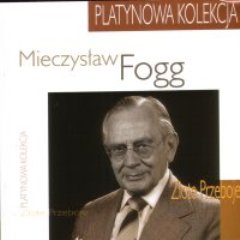Mieczyslaw Fogg – Platynowa Kolekcja (2000)
Mieczyslaw Fogg – Platynowa Kolekcja (2000)

1.Tango Milonga 2.Caluje twoja dlon madame 3.Ramona 4.Czekam cie 5.Nasza jest noc 6.Jak w serenadzie 7.Niebieski walc 8.Cicho grajcie mi 9.Cztery nogi 10.Nietoperze 11.Tango andrusowskie (instrumental) 12.Tulipany 13.Nadejda kiedys takie dni 14.Oczy czarne 15.Fredzio 16.Co nam zostalo z tych 17.Blekitne oczy 18.Pamietam twoje oczy 19.Francois 20.Kiedy znow zakwitna biale bzy 21.To samo niebo 22.Ksiezyc nad Taithi 23.Odpukaj pan 24.Hanko 25.Moze dzis 26.Juz nigdy 27.Szkoda twoich lez 28.Nie bede plakal 29.Gwizdze na wszystko 30.Juz taki jestem zimny dran 31.Graj skrzypku graj 32.Kochana
Mieczysław Fogg (real name Mieczysław Fogiel) was a very popular Polish singer of the twentieth century. His popularity started well before World War II and continued well into the 1980’s. He had a characteristic way of staying very serious yet slightly emotional on stage when singing. He can be compared to French Tino Rossi in style. He had a lyric baritone voice.
Mieczysław Fogiel was born May 30, 1901 in Warsaw, then a provincial town in Imperial Russia. He spent his childhood there and, after graduating from a local gymnasium in 1922, he started working as a railway worker. About that time he also joined the choir of the St. Anne’s Church. There his friend, Ludwik Sempoliński, made him join the classes of music organized by Jan Łysakowski, Eugeniusz Mossakowski, Wacław Brzeziński, Ignacy Dygas and many other notable Polish musicians of the epoch. Initially a hobbyist, in 1928 he met Władysław Daniłowski Dan, who chose him as a solist for his newly-formed Dan’s Choir. The choir became extremely popular the following year when Jerzy Petersburski’s song Tango Milonga became an international hit. This and other tangos and romances performed by the choir in the famous Qui pro Quo theatre led Fogiel to become one of the most popular Polish singers. After 1932 Fogiel, under a new pseudonym of Fogg, toured a number of countries, including Germany, Latvia, USSR, Finland, Norway, Sweden, Austria and Italy. In the United States the group toured 31 states.
His popularity was increased by the fact that Fogg was keen on languages and was able to sing in local languages of the countries he toured. He also appeared in a number of duos with other popular artists of the time, including Hanka Ordonówna, Stefcia Górska, Zula Pogorzelska and Adolf Dymsza. He also appeared in 11 films. After the Dana Choir was disbanded in 1938 Fogg started a solo career. The same year he was chosen as the most popular Polish singer by the Polish Radio. He toured the country with a trio composed of himself, Mira Zimińska and Tadeusz Sygietyński. Among the authors of his songs was also Marian Hemar.
After the outbreak of World War II Fogg remained in Warsaw, where he joined the underground Armia Krajowa. He gave concerts in the few cafes available to Poles under German occupation. During the Warsaw Uprising he gave countless concerts both on the barricades, in hospitals and in the bomb shelters beneath the city. For his efforts to keep high the morale of the soldiers and civilians of the fighting city he was awarded with some of the highest Polish decorations.
After the war, in 1945 he opened up his own cafe in the ruins of Warsaw. The cafe, located at Marszałkowska 119 Street, was the first music theatre opened after the war in the destroyed city and served as one of the very few centres of culture. However, the following year it was nationalized by the new communist authorities of Poland and closed soon afterwards. Fogg continued to give hundreds of concerts in all parts of Poland and also headed his private music record firm Fogg Records, which shared the fate of Fogg’s cafe in 1951. His popularity as a singer remained high and in 1958 he was again chosen the most popular Polish singer by the audience of the Polish Radio - 20 years after he was given the same title for the first time.
He continued to give concerts almost until his death in 1990. Throughout his 60-years long career he gave more than 16,000 of them in all countries of Europe, Brasil, Israel, Ceylon, New Zealand, Australia, Canada and the US. His everlasting popularity led to the creation of a number of anecdotes. In one of them, the Polish archaeologists supposedly discovered an Egyptian mummy. After they unfolded it, they were surprised by the mummy asking a short question: “Is Fogg still giving concerts?”
Mieczysław Fogg died in Warsaw on September 3, 1990. He is buried at the Powązki Cemetery.---last.fm
Last Updated (Saturday, 12 January 2013 13:36)








